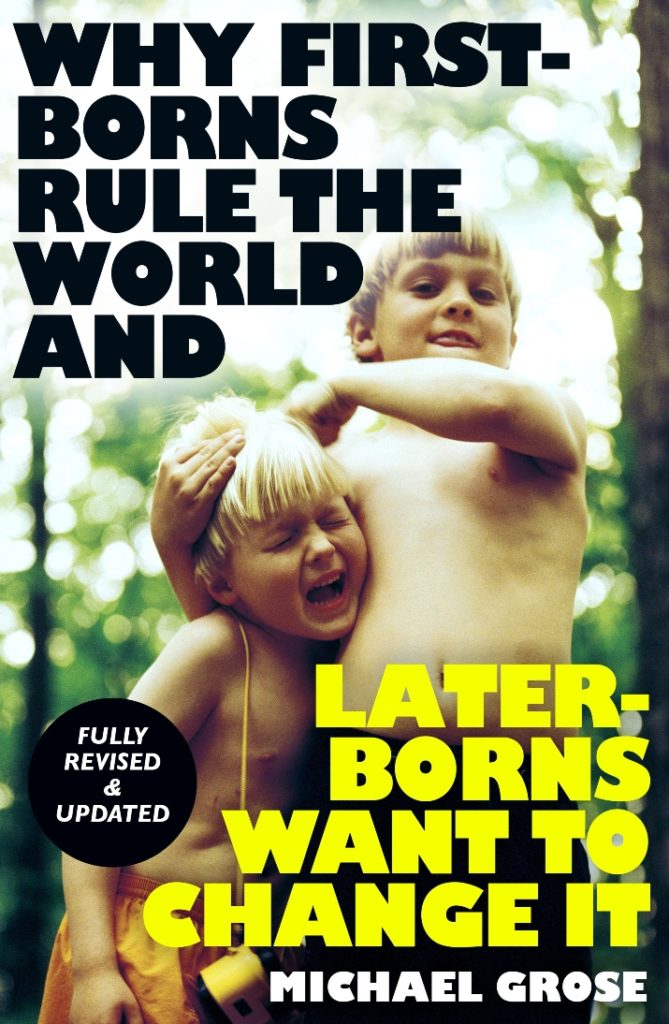
Why First-borns Rule the World and Later-borns Want to Change It was one of the first books that I reviewed on this blog (you can read it here). A key takeaway from this book for me was the importance of using different parenting styles to adapt to the personality of your kids. As Grose states in his book:
No single factor determines a child’s personality or behaviours. A whole range of factors work together to impact on a child’s personality and birth order is just one of them.
And to get the best out of our kids and to help them the most, we need to work with them and their personality.
Why First-borns Rule the World and Later-borns Want to Change It was first published in 2003 and when I first read the book I was reading it looking for insights and tips on how to best parent our first-born child. It has now been republished and this edition includes new information such as:
- The demise of the middle child: In the 18 years since the first edition in 2003, families with children have continued to shrink in size, leading to there being very few middle children
- The problem with first-borns: With an increase in the number of first-borns (nearly 50% of the population in the developed world), known to have traits such as perfectionism and anxiety, there’s a need for mental health awareness
- The ‘Prince Harry’ effect: Prince Harry is a prime example of a modern birth order position – a second child who is also a youngest – as more families consist of just two children
- Birth order for teachers: How teachers can use birth order in classrooms
I have begun reading the new edition not with a view to parent our first-born, but on how I can best parent the youngest in our family. This year he moved into the secondary school stage and while he is doing well and riding the changes that comes with this, I am taking some time to adjust.
With permission from Penguin Random House Australia, I am sharing an extract from the book highlighting some key tips I am finding helpful for parenting the youngest in our family – I hope you find them useful too!
Youngest-borns are reminded every day that there is someone bigger, smarter and more capable than them so they often act out the helpless role that others thrust upon them.
Key message for raising or teaching youngest-borns: let them take responsibility.
1. Don’t let them get lost
Youngest children can easily get lost in the crowd. Their accom- plishments don’t seem to be as big a deal as they were for elder siblings. Make a fuss out of their accomplishments. The art they bring home may be the fourth finger-painting you have received but it is your child’s first, so be surprised.
They can sometimes be teased, put down or laughed at by siblings and you don’t even know it. So it helps to give these kids some ideas to help them stand up for themselves. I remember giving my youngest daughter some practical assertiveness lessons to help her combat some teasing from her older brother. He would call her names and she would either come to me or scream at him in a high-pitched voice, which was exactly the type of reaction that he was hoping for. She practised standing in a strong manner and rehearsed some lines such as, ‘Thank you very much for your opinion but I happen to think otherwise.’ The words were designed to take the wind from his sails and let him know that she wasn’t going to get involved in his games.
Youngests are used to sitting back, so make sure their voice is legitimately heard. Sometimes older siblings do most of the talking for the youngest child. A stranger may ask your youngest their name and an elder sibling may well tell them. Young- est children often get used to allowing elder siblings do all the talking at family gatherings or share news with relatives. You may need to be proactive yourself and invite your youngest to tell Grandma about the family holiday or order the fish ’n’ chips at the takeaway.
2. Give them responsibilities
Youngest-borns sometimes get the message that nothing they do is good enough so they become masters at ducking work or being helpless. Don’t be fooled. Make sure these children have plenty of opportunities to help so they feel important. It is easy to fall into the trap of giving all the responsibilities to the children who are already capable rather than to the children who need to develop this characteristic.
My children’s ability to cook decreases as we move down the family. First-born Sam was given plenty of cooking lessons and opportunities to cook so that by the time he was finished primary school he was cooking a family meal once a week. Fast-forward to youngest Sarah and I was shocked by how little cooking know- ledge she had by the time she finished primary school. It was not so much lack of interest but lack of opportunity, as by then her elder siblings were adept in the kitchen so she took the youngest route – feigned ineptitude – and I fell for it. One way to do a child a disservice is to spoil, pamper or expect very little of them. Their self-confidence plummets and they become locked in a cycle of low self-esteem. It is youngest children who are most likely to be pampered, protected or kept the family baby. Keep a roster of jobs and make sure that the youngest gets their fair share of family responsibilities.
3. Encourage them to make their own decisions
Youngest-borns are used to following the crowd and become expert at avoiding decision-making about a whole range of things. Let them choose from menus, decide what you (or they) should cook for dinner, what they should wear and what movie the family should watch.
4. Put pressure on them
If we need to loosen up on first-borns we often need to put con- siderable pressure on youngest children to put their head down and produce decent work at school. Sometimes being the youngest allows them the luxury of getting away with poor work efforts. Don’t be surprised if you find yourself continually reminding youngest-borns to apply themselves a little harder. This group is skilled at getting away with being less than well-behaved so make sure they experience the consequences of their actions. As most researchers seem to agree that youngest children are less likely to experience discipline and most likely to get a favoured run from parents, it is useful to make a list of some of the rules, responsi- bilities and privileges involving children at different ages. This will help you make life a little more equitable for your youngest.
5. Let go – resist the temptation to hold on
There is a tremendous temptation for parents to keep their youngest as babies for longer than other children. They generally can’t wait for the first-born to grow up, but they often infantilise the youngest because growing up means growing away at some point. When my first-born told me he didn’t need me to walk him to class in the morning I felt happy, and I welcomed his maturity. When my youngest proudly announced that she was too old to walk to the classroom with her father I felt sad, as this was another sign that my youngest was growing up and away from me.
You can buy Why First-borns Rule the World and Later-borns Want to Change It here.

